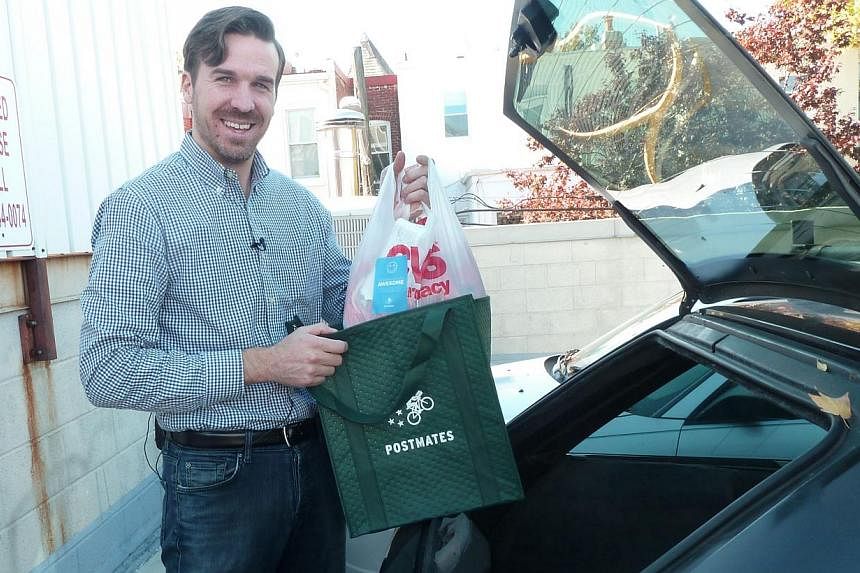WASHINGTON (AFP) - App in hand, Jack Plater-Zyberk has delivered caviar, condoms, chicken nuggets, cases of beer and even a little black dress.
And he can get it to you within an hour.
Plater-Zyberk, a fill-in attorney, who maneuvers his 1992 BMW through Washington streets, is one of an estimated 5,000 independent contractors in the US for Postmates, an online service and smartphone app which delivers anything from lunchtime tacos to late-night diapers.
With Postmates and other start-ups offering quick delivery of meals, groceries and other items, the online world is delivering again, more than a decade after the spectacular collapse of the major players in the space.
In the 2.0 version of online delivery, things are different. Most Americans have high-speed Internet at home, and smartphones as they move around.
The new startups are looking to avoid the mistakes of dot-com busts like Webvan and Kozmo, which invested heavily in warehouses and hired large numbers of staff before going bankrupt.
"The city is our warehouse," said Bastian Lehmann, co-founder of Postmates, which claims to have the largest US on-demand delivery fleet for groceries, meals and a range of other merchandise - all dropped off within 60 minutes.
Postmates, which has raised US$23 million, uses independent deliverers, known as "postmates," who like the flexibility of choosing their work shifts, Lehmann explained.
"We have a lot of students or people who have another part-time job. We have artists, musicians," he said. "There are people who are looking for a job that gives them this flexibility."
Grocery delivery firm Instacart, which has raised US$55 million, expects revenue to grow tenfold this year, and is now in 15 cities with 1,000 "personal shoppers," who are also independent contractors.
"We've had to invest very little in infrastructure outside our technology platform," said Instacart general manager Heather Wake.
Instacart has partnerships with big grocery chains like Whole Foods and Costco and touts its large selection and personalized service.
"Our personal shoppers are trained in grocery selection," Wake said. "We can respond to the customer, so if someone wants bananas that are a little bit brown we can accommodate that."
Companies in the food and grocery e-commerce and delivery industry raised nearly US$486 million in 109 deals globally in the 12 months ending in June, up 51 per cent from a year earlier, according to the venture capital blog CB Insights.
The research firm BI Intelligence estimates that same-day deliveries will generate US$100 million in 20 US cities this year, and that the market will grow to US$2 billion by 2016 and $4 billion by 2018.
Even as startups multiply, established firms are looking to get a piece of the action. The taxi app Uber has launched deliveries in some cities, either using cars or bike messengers, for meals and other items.
Amazon and Google ahve also begun offering same-day grocery delivery.
The "Amazon Fresh" service for groceries and local shops - currently in just a few West Coast locations and New York - is expected to expand further. Google Express in October added Boston, Chicago and Washington for same-day delivery service for groceries, books, sporting goods and other items in partnership with local retailers.

